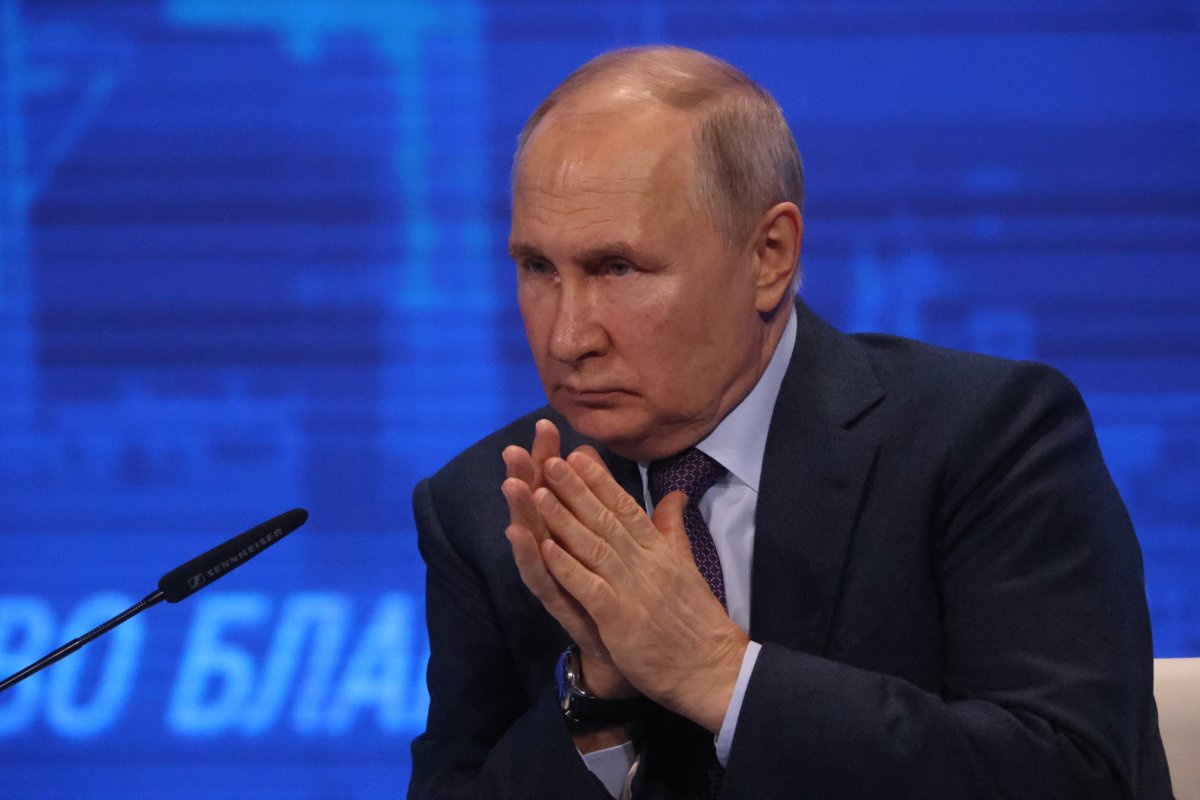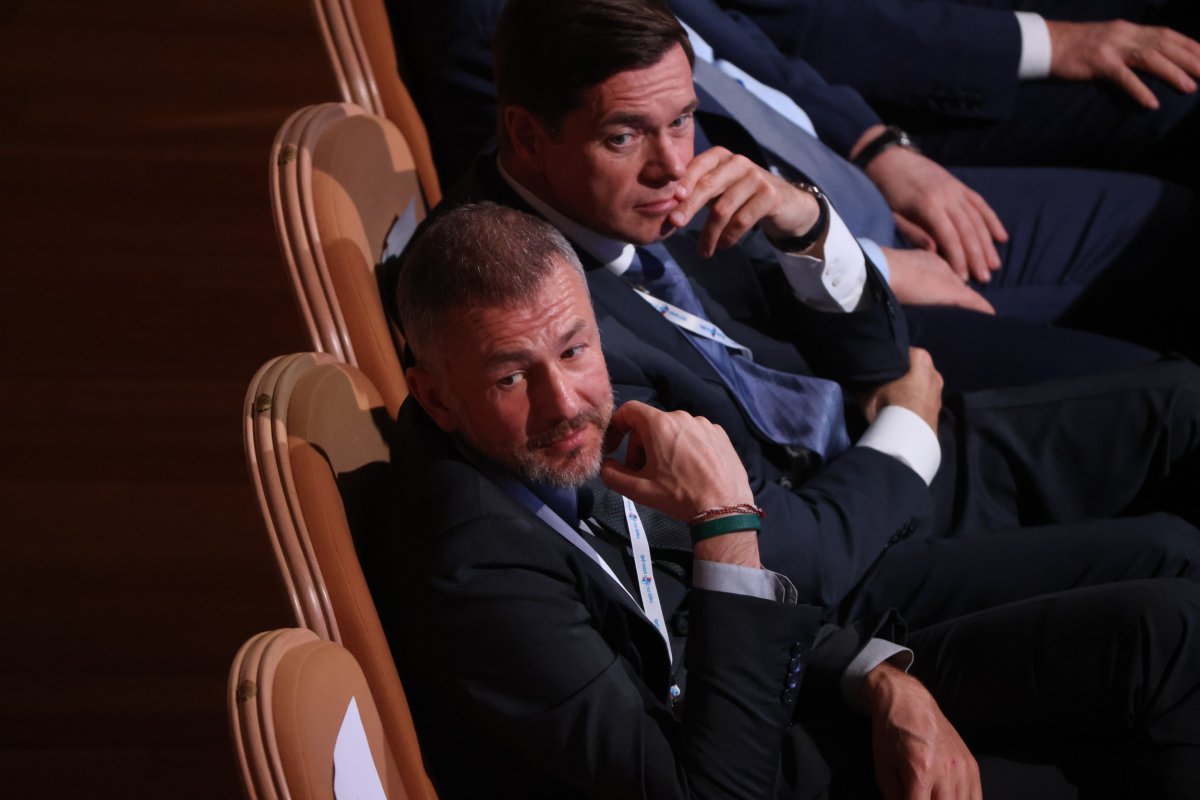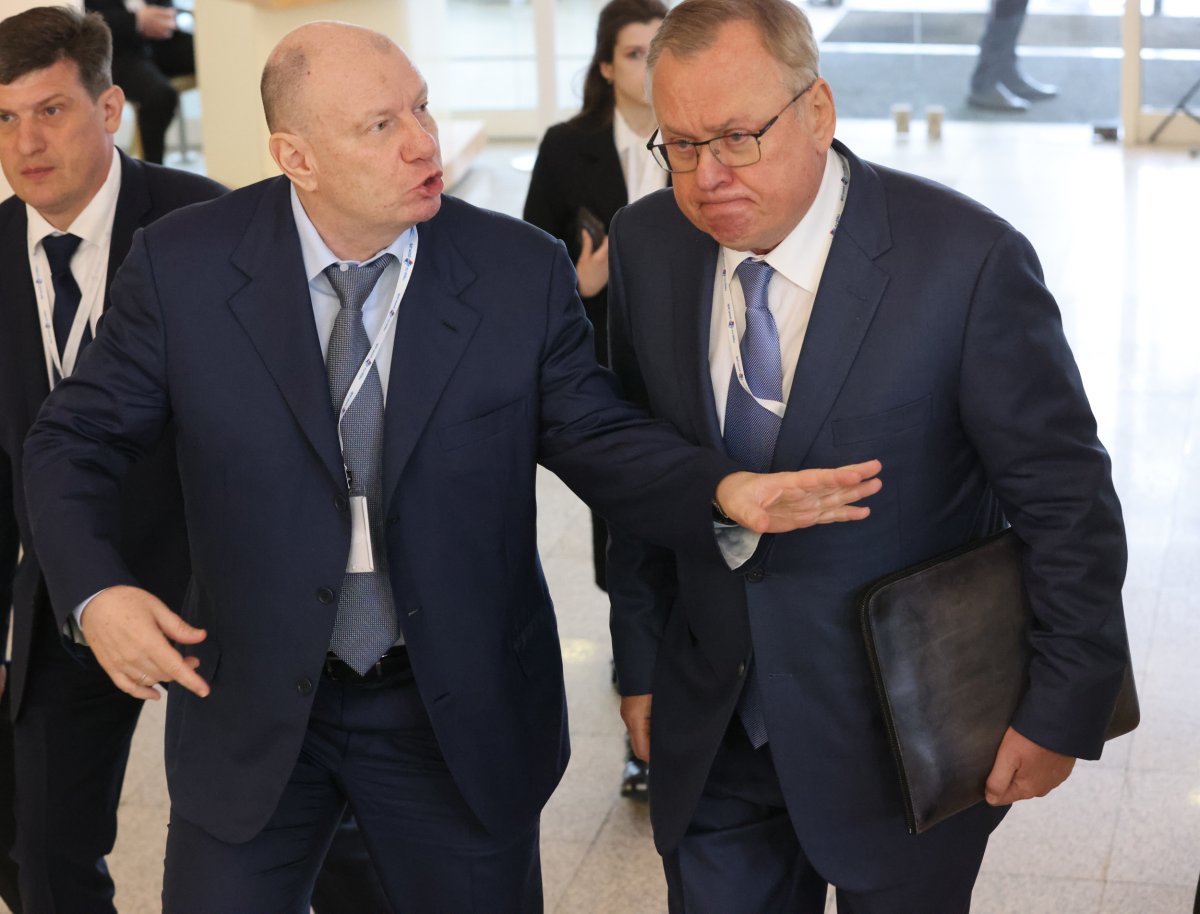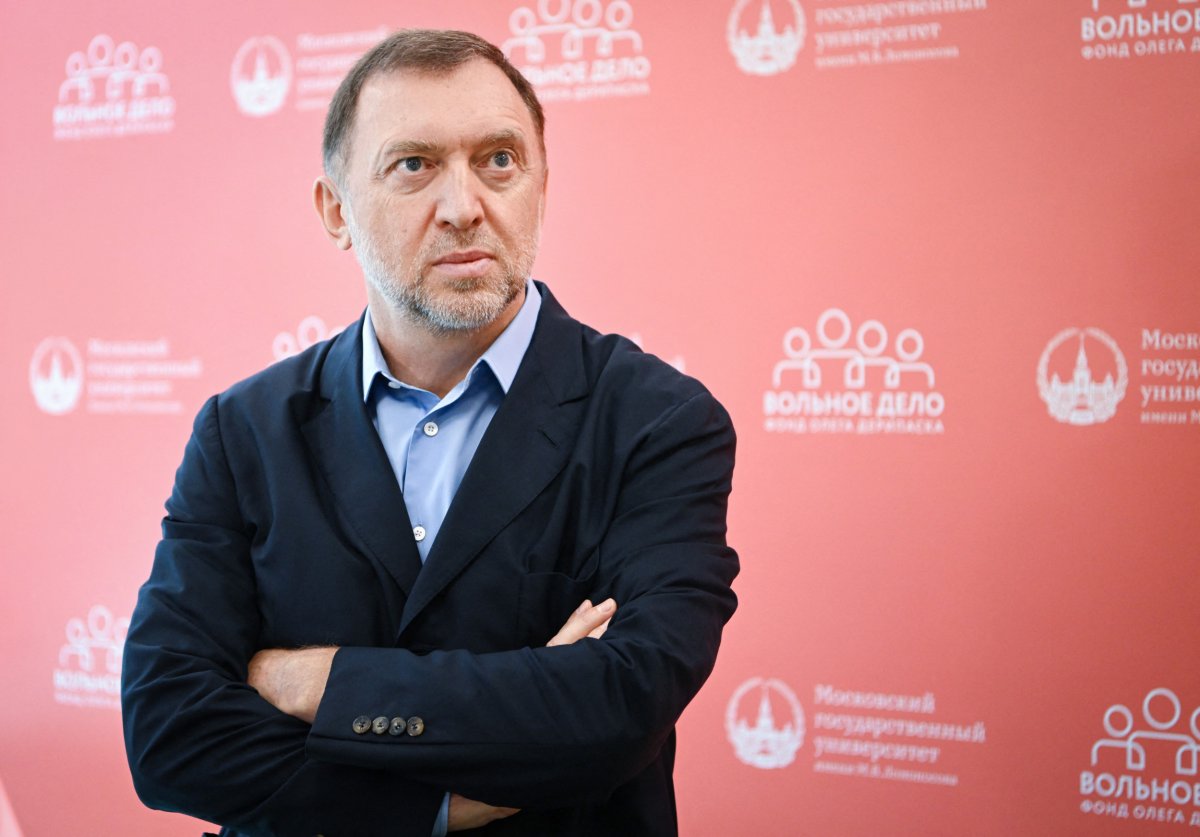- One year into the full-scale invasion of Ukraine, President Vladimir Putin called on Russia's wealthiest to prioritize the national interest over profit.
- A ballooning budget deficit has raised the danger of long-term economic malaise in Russia, with sanctions isolating its major businesses and increasing scrutiny on oligarchs.
- Russia's billionaire oligarchs can make and enjoy fortunes with Putin's blessing, but the Kremlin tolerates little political dissent from their ranks.
President Vladimir Putin last week summoned some of the country's richest and most powerful oligarchs to Moscow to urge them to put patriotism ahead of profits, as unprecedented Western sanctions imperil the fortunes and financial networks that for years have given the Kremlin a back door into the West.
"A responsible entrepreneur is a real citizen of Russia, of his country, a citizen who understands and acts in its interests," Putin told the meeting of the Russian Union of Industrialists and Entrepreneurs (RSPP). "He does not hide assets offshore, but registers companies here, in our country, and does not become dependent on foreign authorities."
Russia's economy has proved more resilient in the short term than Western officials hoped, shrinking by only 2.1 percent in 2022 despite the avalanche of measures seeking to isolate Moscow. But a ballooning budget deficit—in part due to falling fossil fuel export profits—raises the danger of long-term economic malaise for Russia.
But Russia's kleptocracy has clear rules. Oligarchs can make and enjoy fortunes with the blessing—and while paying significant tribute to—Putin and his Kremlin circle. In exchange, Russia's richest stay out of politics and bow to the president when required.

"They are dependent on [Putin's] goodwill," Oleg Ignatov, the Crisis Group think tank's senior analyst for Russia told Newsweek. "Many people in the West think they could influence him. But I think that's not true. They can't influence him. It's he who can influence them."
Putin received a standing ovation after addressing the RSPP meeting, but many in Russia's business community are thought to be unsettled by the full-scale invasion of Ukraine and the subsequent sanctions.
Oligarchs who for years enjoyed the freedom and gross economic opportunities of the West have seen their movements and fortunes come under increasing scrutiny. For most, war is bad for business. But moving against the Kremlin could prove worse.
Kremlin spokesman Dmitry Peskov told Newsweek earlier this month there is no divergence in opinion between Putin and the oligarchs.
But Ignatov offered a different characterization of the relationship. "I think the majority of these people don't like this war," he said. "They're hostages of his rules. They understand well that if they are not complying with these rules then they will lose their assets [...] they would lose everything."
"The choice is very clear for them."
Putin's Men
Peskov told Newsweek in a statement that Putin "is very satisfied with the communication with the RSPP and members of its bureau. Not all the businessmen were present at the meeting. Some of them could not take part. Some of them left the organization.
"The President has always emphasized that membership in the RSPP is voluntary. At the same time, representatives of large businesses adopt a responsible position, provide jobs and pay great attention to social support for employees."
Among those who met with the president last week were 12 particularly powerful figures. Eleven are already on Western sanctions lists due to their close relationship with the dictator and his top Kremlin officials.
The only one not yet sanctioned is the owner of the mammoth Mechel mining company, Igor Zyuzin. The billionaire has fallen foul of Putin in the past, criticized by the then-president in 2008 for reduced export prices of coal and other raw materials. Forbes described the falling out as a "horrendous blow" for Zyuzin.
Of the other 11 who met with Putin in Moscow last week, eight attended a high-profile meeting with the president hours after Russian troops were ordered into Ukraine on February 24, 2022. All those who attended were subsequently placed under sanctions in the West, their audience with Putin perceived as the expression of their support for the so-called "special military operation."

Alexei Mordashov, the main shareholder and chairman of Severstal—one of Russia's largest steel and mining companies—was among the oligarchs attending the 2022 and 2023 meetings. Worth almost $21 billion, Mordashov once owned a stake in Rossiya Bank, which Western officials have characterized as serving as a personal cash box for Putin and his top allies.
Mordashov was also named in the Panama Papers as having generously donated to Putin allies and set up dozens of offshore shell companies through which he funded Putin's pet projects while expanding his own control of multiple industries within Russia. In March, Italian police seized one of his yachts—the Lady M—which was moored in the northern Italian port of Imperia.
In a statement sent to Newsweek, Mordashov said: "What is happening in Ukraine is a tragedy for two fraternal nations. It is terrible that Ukrainians and Russians are dying, people are suffering hardships and the economy is collapsing. I sincerely hope a way can be found in the very near future to resolve this conflict and stop the bloodshed."
"I have never been close to politics and have always focused on building economic value at the companies I have worked for both in Russia and abroad, creating jobs and supporting local communities. I have absolutely nothing to do with the emergence of the current geopolitical tension and I do not understand why the sanctions were imposed on me."
"For a very long time, I have been engaged in the development of economic, cultural and humanitarian cooperation with many Western countries and I fail to understand how these sanctions against me will contribute to the settlement of the dreadful conflict in Ukraine."
Leonid Mikhelson, worth more than $21 billion, made his fortune from Russia's fossil fuels and is the founder and chairman of natural gas producer Novatek. Mikhelson holds Russian and Israeli passports and is a known business partner of fellow billionaire Gennady Timchenko, who has long been a close Putin confidante.
Russian-Belarusian oligarch Dmitry Mazepin is thought to be worth more than $2 billion and is the owner of the mineral fertilizer company Uralchem. He was born in Minsk and served in the Soviet army in Afghanistan as an interpreter. He has been accused of "raider methods," strong-arming targets into selling their assets to him.
Vladimir Potanin began amassing wealth in the lawless days after the collapse of the Soviet Union, earning a fortune from the controversial loans-for-shares program that spawned modern Russia's cast of oligarchs.
Now worth almost $24 billion, Potanin has been under American sanctions since 2018 for his close relationship with Putin and his links to U.S. election meddling. In March 2022, he urged Putin not to seize the assets of foreign companies fleeing Russia, warning it would "take us back a hundred years."

Andrey Bokarev, worth nearly $3 billion, runs Transmashholding, Russia's biggest producer of rolling stock for railways and subway systems. Russian investigative outlet The Insider has alleged that Bokarev is affiliated with the Izmailovo Organized Crime Group and used the privatization of the Central Suburban Passenger Company to enrich affiliates.
Dmitry Pumpyansky has assets worth some $2 billion and was the owner of OAO TMK, a firm that made steel pipes for use by Russia's oil and gas industry. He was first sanctioned by the U.S. in 2017, with other nations following suit after Russia's 2022 invasion of Ukraine. His $80 million superyacht, the Axioma, was seized in Gibraltar in March and was auctioned off in September.
Belarus-born Andrey Melnichenko, a business partner of Pumpyansky, is a fertilizer and coal magnate worth some $25 billion. Melnichenko told the Swiss publication Weltwoche that he learned of his sanctioning while watching television on his 50th birthday and said the February 24 sit-down with Putin was a "normal meeting," and has described his characterization as a Putin ally as "absurd."
The other three magnates attending last week's meeting in Moscow did not attend the February 2022 gathering. Among them is Oleg Deripaska, a well-known business leader worth around $2.5 billion. A victor of the post-Soviet "aluminum wars," Deripaska founded the Rusal company and was Russia's richest man before the 2008 financial crisis. He was sanctioned by the U.S. after Moscow seized Crimea in 2014.

Deripaska is said to have long enjoyed a close relationship with the president, though has spoken out publicly against the ongoing war in Ukraine suggesting it would be a "colossal mistake" for the Kremlin to destroy the country. In March last year, he also said that sanctions could mean "there will be no money already next year."
In December, The Financial Times reported that the state seizure of a $1 billion hotel complex owned by Deripaska was motivated by his criticism of the war.
Peskov told Newsweek that Deripaska "often participates in socially significant discussions, but this does not affect his business in any way." Of the businessman's apparent negative opinion of the war, the Kremlin spokesperson said, "We don't know anything about it."
"It is important to note that Mr. Deripaska and other members of the RSPP and its bureau faced sanctions of the collective West," Peskov said. "In violation of all the laws, their property and assets were blocked or seized. Now they do not consider either the Western banking system or the countries of the West as reliable objects for investment."
A representative for Deripaska disputed his characterization as an "oligarch," arguing that the businessman was not part of the post-Soviet privatization schemes that birthed the new elite, and never acquired any state assets.
Deripaska, the representative told Newsweek, "has never had any special relationship with Vladimir Putin and has never been closely linked to him...To insinuate some sort of special links or treatment is simply wrong. He had ordinary links, just as any other industrialist of his scale would have in any country around the world."
Ukrainian-Russian German Khan was also among those in Moscow last week. After emerging from the wholesale consumer sales business in the post-Soviet period, Khan co-founded Alfa Group with college friend Mikhail Fridman. Alfa Group went on to become Russia's largest privately owned investment group.
The Alfa Group co-founders—Khan, Fridman, Petr Aven, and Alexei Kuzmichev—are all now under sanctions. Aven and Fridman are currently among the oligarchs leading appeals against their inclusion on Western sanctions lists.
Viktor Vekselberg is the owner and president of the Renova Group. Worth around $6.7 billion, he has long been seen as close to the Kremlin as was sanctioned in 2018 related to the annexation of Crimea. Vekselberg has links to Republican Party mega-donor Len Blavatnik.
Also in the hall last week were several powerful heads of state-owned companies. Among them was Igor Shuvalov who served as first deputy prime minister in Putin's second cabinet and now chairs the State Development Corporation VEB.RF; Mikhail Oseevsky who is the president of PJSC Rostelecom, Russia's largest provider of digital services and solutions; and Andrey Kostin who is the chairman of the VTB Management board.
Update 03/21/23, 10:40 a.m. ET: This article has been updated to include comment from Alexei Mordashov, a representative of Oleg Deripaska, and Kremlin spokesman Dmitry Peskov.
Uncommon Knowledge
Newsweek is committed to challenging conventional wisdom and finding connections in the search for common ground.
Newsweek is committed to challenging conventional wisdom and finding connections in the search for common ground.
About the writer
David Brennan is Newsweek's Diplomatic Correspondent covering world politics and conflicts from London with a focus on NATO, the European ... Read more
To read how Newsweek uses AI as a newsroom tool, Click here.








